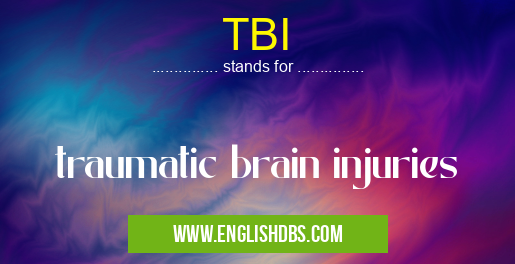What does TBI mean in UNCLASSIFIED
Traumatic Brain Injury, commonly referred to as TBI, is a serious condition that occurs when the brain experiences trauma or a violent blow. The severity and outcome of a TBI can vary greatly depending on the type and cause of injury, as well as underlying medical conditions and other factors such as age. With proper diagnosis and treatment, individuals with a TBI are often able to recover, however severe cases can have long-term physical, mental and cognitive effects that can be hard to overcome.

TBI meaning in Unclassified in Miscellaneous
TBI mostly used in an acronym Unclassified in Category Miscellaneous that means traumatic brain injuries
Shorthand: TBI,
Full Form: traumatic brain injuries
For more information of "traumatic brain injuries", see the section below.
What is Traumatic Brain Injury (TBI)
Traumatic brain injury (TBI) happens when an external force such as an impact or penetration damages the brain. The severity of TBIs can range from mild to severe, with the more serious cases leading to permanent physical, intellectual, or emotional impairments. There are several types of traumatic brain injuries including closed head injuries, which occur when blunt force trauma causes damage without penetrating the skull; open head injuries involving penetrating objects like bullets;and diffuse axonal injuries which occur when sudden force causes damage to nerve cells throughout the brain.
Effects of Traumatic Brain Injury
The effects of traumatic brain injury can vary depending on the location and severity of injury. Physical symptoms include headaches, ataxia (inability to coordinate movements), tinnitus (ringing in the ears), seizures, dizziness and changes in vision or hearing. Cognitive impairments associated with TBI may include difficulty understanding language or comprehending abstract concepts; poor memory or concentration; slowed thinking processes; difficulty learning new information; disorientation; attention deficits and aggression. Mental health issues such as depression and apathy are also common following a traumatic brain injury.
Treatment for Traumatic Brain Injury
Getting prompt medical treatment is essential for those who have experienced a traumatic brain injury. Depending on the severity of symptoms physicians may recommend hospitalization where they will provide immediate care before assessing whether longer-term treatment is necessary. This might include physical therapy to help regain strength and coordination after an injury; speech therapy for difficulties in communication; occupational therapy for activities like dressing oneself or driving a car that can become difficult after a TBI; and psychological counseling if needed due to changes in behavior such as depression or anxiety caused by a TBI.
Essential Questions and Answers on traumatic brain injuries in "MISCELLANEOUS»UNFILED"
What is a traumatic brain injury?
A traumatic brain injury (TBI) is an alteration in brain function, or other evidence of brain pathology, caused by an external force. This includes a wide range of impacts from mild concussions to severe permanent disabilities.
What are the most common causes of TBIs?
The most common causes of TBIs are motor vehicle accidents, falls, assaults, and sports-related injuries.
Are there different types of TBIs?
Yes, there are two main types: closed head injuries and open head injuries. Closed head injuries occur when the skull is not penetrated by an external object and open head injuries occur when the skull is penetrated by an external object such as a bullet or knife.
Is it possible for a TBI to be fatal?
Yes, depending on the severity of the injury and other complicating factors, it is possible for a TBI to be fatal.
Are there long-term effects associated with TBIs?
Yes, long-term effects associated with TBIs can include physical impairments such as difficulty walking or limited mobility; cognitive difficulties such as memory loss, difficulty concentrating or impaired judgment; and communication impairments such as language problems or difficulty understanding speech.
Is it always necessary to seek medical attention following a suspected TBI?
Yes, any type of trauma to the head should be evaluated by medical professionals immediately. Even if there was no loss of consciousness after the incident it is important that you seek medical help so that any potential complications can be addressed quickly before they become more serious issues.
Are there proven treatments for someone with a TBI?
Yes, depending on the severity of the injury and individual circumstances there are various treatments available for people who have experienced a TBI including physical rehabilitation programs to help improve mobility; occupational therapy programs to help improve everyday functioning; and speech therapy programs to help address communication issues resulting from the injury.
: Can someone recover completely from aTBI?
It highly depends on how severe their injury was but yes it is possible for someone to make a full recovery from a traumatic brain injury if they follow their treatment plan closely and get adequate rest and support throughout their recovery process.
: Can stress contribute to further complications for someone withaTBI?
Stress can have a major impact on those who have suffered fromaTBIasitcancauseadetrimentaltosomeof their cognitive processes. Therefore it is important for themtolearnstrategiestomanageandreducestress levelssoastopreventfurthercomplicationsassociatedwiththeinjury.
:Whatcan families do to best support individuals affected by TBIs?
Families can best support individuals affectedbyTBIsthroughactivelisteningandsupport duringeverystageoftherecoveryprocessencouragingthemtokeeptryingnodematterhowdifficulttheymayfind certain tasks or activities, providing emotional support throughkindnesspatienceandunderstanding,helpingthemaccessappropriateresourcesand promote healthy lifestyle practices like regular exerciseandgoodnutritionhabits.
Final Words:
Traumatic brain injuries are serious conditions that require prompt professional medical care for best outcomes but many patients still experience long-term physical and cognitive affects even with proper diagnosis and treatment plans in place. It is important to know how to recognize symptoms associated with traumatic brain injuries so individuals affected by them can receive appropriate care quickly and begin their journey towards recovery.
TBI also stands for: |
|
| All stands for TBI |
